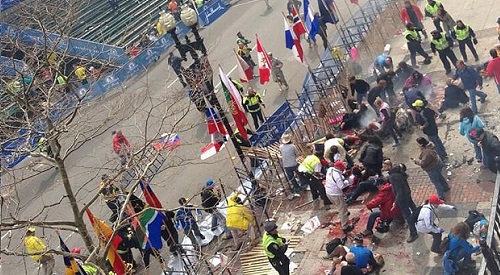
The Boston Marathon: Healing with Sports
Sports are supposed to be fun. Sports are supposed to be an escape from the rest of the world. The Boston Marathon is supposed to be a celebration of human accomplishment. Patriot’s Day in Massachusetts is supposed to honor the brave men and women that fought to found this nation.
On April 15, everything the day and the marathon were supposed to be became targets, just the same as the innocent men and women around the blast zone. The real world burst the bubble. Three dead. Dozens injured, many severely.
That wasn’t supposed to be.
As news filtered in through Twitter and television and radio, it felt wrong to think about anything but the victims, and maybe the evil that led to there even being victims. It felt wrong to think about runs and goals and slam dunks. It felt wrong to think about sports while a city that thought violence on that scale existed solely in their revolutionary past was traumatically informed otherwise thanks to a pair of explosions.
A sporting event was attacked and the human cost immediately made all other sporting events seem wholly insignificant, because in the broad scheme of things, that is what they are. It was sobering, it was terrifying and it made us think about the darkest parts of humanity. Sporting events aren’t supposed to do that.
[php snippet=1]
Two blasts changed the entire tone of the day. A friend goes to school in Boston, and is a die-hard Red Sox fan. While his earlier tweets had been celebrating Boston’s 3-2 win in their traditional Patriot’s Day 11 AM game against Tampa Bay, he spent the rest of the day letting friends and family know that he was near the blast but unharmed. Sports left his mind, replaced by a mad scramble for meaning and information.
The Tampa Bay Rays found out about the bombing in the visitor’s locker room at Fenway Park following their loss. They departed to the airport to fly to Baltimore without the police escort that was supposed to accompany them. That escort was off doing something of considerably more importance.
Former Patriots guard Joe Andruzzi was at the marathon. Today the nation knows him not for his exploits on the field, but for how he responded to the chaos. He became not a sports hero, but a real one.
The Boston Bruins scheduled tilt against the Ottawa Senators was quickly postponed, to be made up later in the season. An NBA game was supposed to take place in Boston Tuesday, with the Celtics taking on the Pacers. The NBA wisely cancelled that game, never to be made up, marking the first time since the NBA schedule expanded to 82 games that a team would play fewer than 82 games. On a day when Bostonians were urged to avoid congregating in large groups, who can blame either league?
And then shone ESPN. The cable giant preempted all scheduled programming in the early afternoon, instead broadcasting Bob Ley and Jeremy Schaap’s coverage of the bombing from the SportsCenter studio. Ley and Schaap were incredible, steady hands in complete control of a situation no sportscaster wants to have to report on. In the print world Sports Illustrated scrapped their planned cover just hours before deadline and moved the tragedy to the front.
And sports took a back seat, exactly as they should have.
But then, as they often do, sports helped us cope.
ESPN’s coverage of the bombing finally gave way to the Phillies-Reds game. Philadelphia outfielder Ben Revere wrote “Pray for Boston” on his glove before the game, and during it he made one of the greatest catches baseball will see all season. That felt good. That is what sports are supposed to be.
While watching WWE Raw later I saw a Mass General employee on a comment board mention how they had been looking forward to the show ever since the bombs went off, just to get their mind off the tragedy. That is what sports, scripted or not, can do for a few hours. That is what sports are supposed to be.
Later still, the tones of Vin Scully telling firsthand stories about Branch and Jackie during the late night Dodger game helped many feel happy for the first time since the explosions.
The day after the tragedy one of the more moving tributes to the victims and the city of the bombings came courtesy of the Chicago Tribune’s sports page.
All of this is how sports are supposed to be.
Sports had become something they were not supposed to be on Monday afternoon. By Monday night things weren’t fixed, the Boston Marathon was still irrevocably changed. But sports did what they do best; they took our minds off the bigger problems for an hour or two. Sports make it easier to cope, even if things are still broken.
Mostly, the rest of the sports world on Monday reminded us that while one sporting event was attacked, marred by evil, sports almost always carry with them an overwhelming sense of joy and goodness.
That is exactly how they are supposed to be, and that is exactly how people are, no matter how much some try to convince us otherwise.
[php snippet=1]

